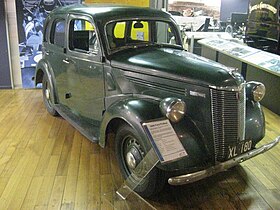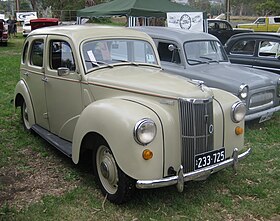Ford Prefect (car)
| Ford Prefect | |
|---|---|

1948 Ford Prefect E93A Saloon
|
|
| Overview | |
| Manufacturer |
Ford UK Ford Australia |
| Production | 1938–1961 |
| Chronology | |
| Predecessor | Ford 7Y |
| Successor | Ford Anglia |
| Ford Prefect E93A | |
|---|---|

1948 Ford Prefect E93A 4 door Saloon
|
|
| Overview | |
| Production | 1938–1949 |
| Assembly |
United Kingdom Australia |
| Body and chassis | |
| Body style | 2-door saloon 4-door saloon 2-door tourer 2-door drophead coupé 2-door van (Australia) 2-door coupé utility (Australia) 2-door roadster utility (Australia) |
| Related |
Ford Anglia Ford Popular |
| Powertrain | |
| Engine | 1172 cc Ford side-valve I4 |
| Transmission | 3-speed manual |
| Dimensions | |
| Wheelbase | 87 in (2,210 mm) |
| Length | 151 in (3,835 mm) |
| Width | 61 in (1,549 mm) |
| Height | 63.5 in (1,610 mm) |
| Ford Prefect E03A | |
|---|---|

Ford Prefect E03A 4 door Saloon
|
|
| Overview | |
| Production | 1939–1945 |
| Assembly | Australia |
| Body and chassis | |
| Body style | 2-door saloon 4-door saloon 2-door tourer 2-door coupé utility 2-door roadster utility 2-door van |
| Powertrain | |
| Engine | 1172 cc Ford Straight-4 side-valve |
| Ford Prefect A53A | |
|---|---|

Ford Prefect A53A 4 door Saloon
|
|
| Overview | |
| Production | 1946–1948 |
| Assembly | Australia |
| Body and chassis | |
| Body style | 4-door saloon 2-door coupé utility 2-door van |
| Powertrain | |
| Engine | 1172 cc Ford Straight-4 side-valve |
| Ford Prefect E493A | |
|---|---|
 |
|
| Overview | |
| Production | 1949–1953 |
| Body and chassis | |
| Body style | 4-door saloon |
| Powertrain | |
| Engine | 1172 cc Ford Straight-4 side-valve |
| Transmission | 3-speed manual |
| Dimensions | |
| Wheelbase | 94 in (2,400 mm) |
| Length | 151 in (3,800 mm) |
| Width | 61 in (1,500 mm) |
| Height | 63.5 in (1,610 mm) |
| Ford Prefect A493A | |
|---|---|

Ford Prefect A493A 4-door Saloon
|
|
| Overview | |
| Production | 1949–1953 |
| Assembly | Australia |
| Body and chassis | |
| Body style | 4-door saloon 2-door coupé utility |
| Powertrain | |
| Engine | 1172 cc Ford Straight-4 side-valve |
| Ford Prefect 100E | |
|---|---|
 |
|
| Overview | |
| Production | 1953–1959 |
| Assembly | United Kingdom Australia New Zealand: Lower Hutt Singapore: Bukit Timah |
| Body and chassis | |
| Body style | 4-door saloon |
| Related |
Ford Anglia Ford Popular Ford Squire Ford Escort Thames 300E |
| Powertrain | |
| Engine | 1172 cc Ford side-valve I4 |
| Transmission | 3-speed manual |
| Dimensions | |
| Wheelbase | 87 in (2,210 mm) |
| Length | 152 in (3,900 mm) |
| Width | 57 in (1,400 mm) |
| Height | 58.5 in (1,490 mm) |
| Ford Prefect 107E | |
|---|---|
 |
|
| Overview | |
| Production | 1959–1961 |
| Body and chassis | |
| Body style | 4-door saloon |
| Powertrain | |
| Engine | 997 cc Ford Straight-4 overhead valve |
| Dimensions | |
| Wheelbase | 87 in (2,200 mm) |
| Length | 150 in (3,800 mm) |
| Width | 61 in (1,500 mm) |
The Ford Prefect is a line of British cars which was produced by Ford UK between 1938 and 1961 as a more upmarket version of the Ford Popular and Ford Anglia models. It was introduced in October 1938 and remained in production until 1941; returning to the market in 1945, it was offered till 1961. The car progressed in 1953 from its original perpendicular or sit-up-and-beg style to a more modern three-box structure. Some versions were also built and sold by Ford Australia.
Like its siblings, the car became a popular basis for a hot rod, especially in Britain, where its lightweight structure and four-cylinder engines appealed to builders.
The Ford Prefect was introduced in October 1938 and built by the Ford plant in Dagenham, Essex. The original Ford Prefect was a slight reworking of the previous year's 7Y, the first Ford car designed outside of Detroit, Michigan. It was designed specifically for the British market. It had a 1,172 cc (71.5 cu in) side-valve engine with thermocirculation radiator (no pump) and the ability to be started by a crank handle, should the battery not have sufficient power to turn the starter motor, running from the six-Volt charging system. The windscreen wipers were powered by the vacuum ported from the engine intake manifold — as the car laboured uphill the wipers would slow to a standstill due to the intake manifold vacuum dropping to near nil, only to start working again as the top was reached and the intake vacuum increased. The windscreen opened forward pivoting on hinges on the top edge; two flaps either side of the scuttle also let air into the car. The car has a durable four-cylinder motor.
The most common body styles were two- and four-door saloons, but pre-war a few tourers and drophead coupés were made. Post-war, only four-door saloons were available on the home market, but two-door models were made for export.
...
Wikipedia
